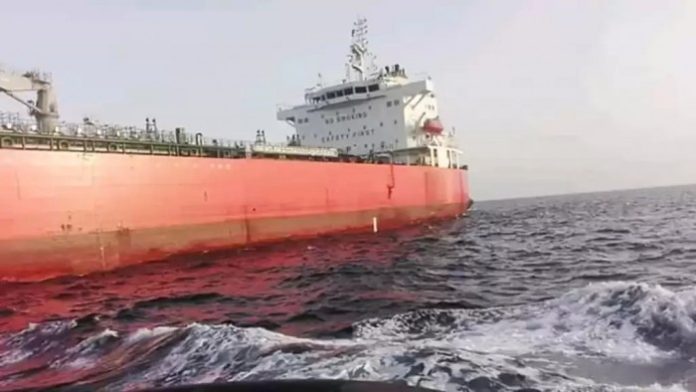Two weeks ago, an Iranian oil tanker arrived at the port of Banias loaded with one million barrels of crude oil. At the time, the Syrian Ministry of Oil said that an oil tanker anchored in the port of Banias on the Mediterranean to unload its cargo at the refinery. This announcement came 10 days after the Syrian government began “legalizing” the distribution of petroleum products due to the obstruction of transit in the Suez Canal (the Evergiven crisis), which exacerbated the daily oil derivatives crisis that the Syrians lived through.
Iran’s sending of oil tankers to Syria is not a new development, but Russia’s decision to enter this pipeline calls for contemplation.
In a report, the “Israeli” intelligence website “Deepka” reports on Iranian and Russian sources that they revealed that Russia will accompany “from now on” Iranian tankers loaded with oil and wheat on their way to the Syrian ports via the Mediterranean after crossing the Suez Canal.
The site adds, “A tripartite meeting was held recently that brought together Russian, Iranian and Syrian officials to search for ways to break the American and European blockade imposed on Syria.” And the “Israeli website” writes: “They launched a” joint mission “to improve multilateral coordination to secure the delivery of oil to Syria.
The report continues by saying that “the tripartite decision did not mention Israel despite the fact that a report from American sources indicated last month that Israel attacked 12 Iranian tankers within two years while crossing the Mediterranean towards the Syrian ports.”
The site writes: “Although the Russian mission explicitly referred to the United States and Europe, that is, the blockade of the North Atlantic Treaty Organization” NATO. Certainly, “Israel” will take into account the deterrent effect of the Russian naval mission and will be keen to avoid clashing with Russian warships which secure Iranian shipments to Syria”.
The site quotes a Russian source as saying that the Russian naval escort will apply to 4 Iranian tankers carrying crude oil and fuel. The Russian source explained: “The supply of oil will continue during the next phase, through a number of Iranian ships that will be sent to Syria at one time, and the Russian fleet will secure them in the Mediterranean,” indicating that the process will continue until the end of this year.
In this regard, the site comments:
“It is not clear whether the Iranian tankers will enter the water all at once,” noting that the Russian statement also mentioned that ships transporting foodstuffs and some basic commodities, among them (products) the pharmaceutical industry in particular.
The site adds that “the Russian source stressed that Moscow and Tehran laid the foundations for the maritime escort mission due to the US forces’ seizure of the Syrian oil fields and their transfer of oil production to the Kurdish elements in northern Syria and Iraq.” Note that Syrian Oil Minister Bassam Tohmeh estimated that “the total losses for the direct and indirect oil sector exceeded $ 92 billion.
With regard to “Deepka” military sources, she said that Russian ships were seen escorting one Iranian tanker to Syria after crossing the Suez Canal towards the Mediterranean. The website writes: “An Iranian-Syrian agreement indicated the opening of a shipping line between the ports of Bandar bin Abbas and Latakia, but no evidence of this was detected.”



